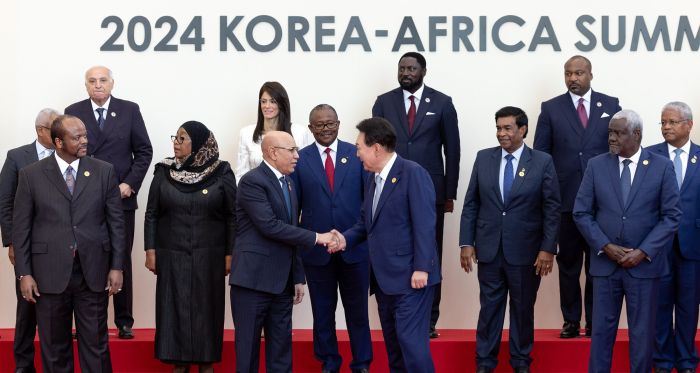Africa’s growing significance on the global stage has intensified competition among global powers seeking to deepen strategic partnerships with the continent. Through the Forum on China-Africa Cooperation (FOCAC), China aims to solidify its leadership within the Global South by strengthening ties with Africa, viewing it as both a strategically valuable market and a geopolitical partner. Also, other emerging powers are courting Africa through platforms such as the India-Africa Summit, Italy-Africa Summit, Saudi-Africa Summit, and Turkey-Africa Partnership Summit, all vying to bolster their standing in the Global South.
Similarly, in the past two years, South Korea, recognizing these dynamics and the continent’s potential, has significantly elevated Africa’s role in its Indo-Pacific Strategy (IPS) and integrated it into its foreign policy priorities. With a combined population of 1.4 billion and a combined GDP of C$4.6 trillion, Africa’s 54 countries are a vast emerging market with enormous potential. The continent’s average GDP growth rate of 3.1 per cent surpasses the global average of 2.9 per cent, with ample room for further expansion. This growth is bolstered by the continent’s favourable demographics — 70 per cent of the population of sub-Saharan Africa is under the age of 30 — and its rich natural resources, including 30 per cent of the world’s critical minerals.
Africa’s strategic importance to South Korea is evident in several developments:
- South Korea recognized Africa as a strategic partner in its 2022 IPS.
- In June 2024, Seoul hosted the first-ever Korea-Africa Summit, with 48 of Africa’s 54 countries meeting in the South Korean capital to discuss issues ranging from economic co-operation and development to security and technology. Through a joint declaration, the two sides emphasized enhancing trade and investment.
- South Korea’s official development assistance (ODA) to Africa is projected to increase dramatically, from C$628 million in 2023 to C$13.6 billion by 2030. It is also providing C$19.1 billion in export financing for South Korean companies operating in Africa.
These developments highlight the seriousness with which South Korea views its relationship with Africa, recognizing the continent as a place of opportunity and a key partner in its vision of becoming a ‘Global Pivotal State.’ South Korea’s interests encompass not only economic opportunities and resource security but also diplomatic alliances, technological partnerships, and a commitment to maritime stability and sustainable development.
Protecting Vital Shipping Lanes
Africa is crucial to South Korea’s global supply chain security, particularly in maritime trade. The waters off Africa’s eastern coast, including the Red Sea, Gulf of Aden, and Western Indian Ocean, are vital trade arteries, especially for South Korea’s energy imports. South Korea’s crude oil imports from Algeria, Azerbaijan, Libya, and Kazakhstan regularly pass through the Red Sea route. Additionally, South Korea’s most critical oil trade route, the Strait of Hormuz — which accounts for about 80 per cent of South Korea’s crude oil imports — is geographically and economically connected to these waters. Furthermore, in 2023, about 80 per cent of South Korea’s total exports to the EU and approximately 50 per cent of its imports from the EU relied on the waters off of East Africa.
This region, however, is a hotspot for piracy and terrorism, particularly in the Gulf of Aden and off the Somali coast. Although international efforts have reduced the number of piracy attacks, the threat — and potential threat to vital shipping lanes — remains.
South Korea’s response to these threats has been robust. Since 2009, the South Korean Navy has deployed its Cheonghae Unit in the Gulf of Aden, conducting operations to protect both South Korean vessels and those of its allies as part of the multinational combined maritime forces. Co-operation with East African coastal countries includes crucial logistical support and intelligence-sharing.
Tapping New Markets for Technology and Training
Recognizing the challenges of competing with artificial intelligence (AI) giants like OpenAI, South Korea has offered tailored AI infrastructure services to countries with less developed AI capabilities, including some countries in Africa. This approach not only addresses the specific needs of emerging markets but also reinforces South Korea’s role as a key global player in technological innovation.
Following the Korea-Africa Summit, the Global ICT Leadership Forum — also hosted by South Korea — provided a catalyst for Seoul to actively pursue AI collaboration with African countries. Key initiatives include AI-driven development projects, such as the collaboration with Nigeria on establishing an ICT and AI training centre and showcasing AI-powered water purification systems to water-scarce African countries like Madagascar and Kenya. These projects reflect South Korea’s focus on providing tech-based solutions and emphasizing capacity-building and technology transfer.
The synergy between South Korea’s technological strengths and Africa’s market potential could drive further growth as more African countries adopt digital solutions. The African Continental Free Trade Area (AfCFTA), which came into effect in 2021, enhances this potential by creating a single market for goods and services, making it easier for South Korean companies to enter and expand within Africa.
Mobilizing Support for Foreign Policy Goals
In the lead-up to the Korea-Africa Summit, the South Korean government emphasized the African continent’s diplomatic heft in forums such as the United Nations, pointing out that collectively it has 54 votes, “more than any other continent.” While serving as a non-permanent member of the UN Security Council (UNSC) for the 2024-25 term, South Korea has an interest in securing the support of these countries, especially the ‘A3’ — the three non-permanent African members on the UNSC.
Strengthening ties with African countries is crucial for South Korea to gain support for UNSC resolutions on the Korean Peninsula. However, several African countries have longstanding military and diplomatic ties with Pyongyang. For example, some have been accused of importing arms from North Korea and working with Pyongyang to maintain their fighter planes and missile systems and train special forces, despite UN sanctions. Thus, while Seoul has made progress in deepening its ties with African countries, it still faces challenges in securing African support for South Korea’s initiatives in international forums, particularly regarding sanctions on North Korea.
Crafting a Unique Approach
South Korea’s recent engagement with Africa marks a departure from its previous, more limited interactions, which focused on humanitarian aid or UN peacekeeping activities. It is also seeking to differentiate its Africa engagement from other major powers such as China, the U.S., France, the U.K. and other Western powers. For many African leaders, South Korea’s historical experiences, including its colonial past and post-war recovery, offer an inspiring model for economic development and modernization that is respectful of the sovereignty concerns of African states. This approach positions South Korea as an attractive partner for many African countries navigating their own development paths and as an alternative or addition to China and the U.S. in the region.
Moreover, South Korea’s deeper engagement with the Global South is not just about soft power; it is also a strategic move to collaborate more closely with African countries on shared global challenges, such as climate change, positioning itself as a valuable partner in these efforts.
However, South Korea’s approach to engaging with Africa could face several challenges. These include a lack of clarity on its goals and plans and a lack of specificity on its investment commitments, particularly around job creation and technology transfer. Additionally, inadequate infrastructure and logistical hurdles may impede economic co-operation and technology transfer. Harmonizing regulatory frameworks and ensuring sustainability through joint efforts in eco-friendly technologies will also be critical to the success of this engagement strategy.
Regular meetings and consultations, such as the Korea-Africa Economic Cooperation Committee (KOAFEC), the 2026 Korea-Africa Foreign Ministers’ Meeting, and Korea-Africa Critical Mineral Dialogues, will be vital in monitoring the progress of the collaborative projects and ensuring their successful implementation.
Relevance for Canada
Canadian foreign minister Mélanie Joly’s August trip to Côte d'Ivoire and South Africa signalled Canada’s intent to engage more actively with Africa as it finalizes an ‘approach’ towards the continent. As other global powers advance their strategic partnerships, Canada risks falling behind if it continues to rely primarily on humanitarian assistance as the primary tool for engagement. While Joly’s discussions covered other areas, such as counterterrorism and economic partnerships, which largely centred on humanitarian assistance, there is an increasing need to expand these efforts to include more robust trade, investment, and technological collaboration in areas where Canada holds a competitive edge.
One area in which Canada, South Korea, and Africa could find synergy is critical minerals. Africa is home to 30 per cent of the world’s critical mineral resources, which are also of great interest to Canadian mining companies. South Korea, as a leading global manufacturer, seeks reliable access to these resources, while Canada, with its expertise in mining and strong environmental standards, can play a crucial role in developing sustainable supply chains.
By partnering with African countries, Canada and South Korea can ensure that Africa benefits from its natural resources through fair trade practices and joint capacity-building initiatives. Through such a partnership, Canada can strengthen its standing in Africa, deepen co-operation with South Korea, and contribute to a more stable and equitable global supply chain. By leveraging its unique assets, such as its French-language ties through La Francophonie, Canada can also strengthen relations in Francophone African countries and play an important role in the emerging global landscape.
• Edited by Erin Williams, Senior Program Manager, Asia Competencies, and Vina Nadjibulla, Vice-President Research & Strategy, APF Canada


